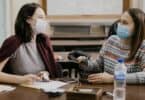The Covid-19 pandemic has been around for a year (2019-2020). Being a relatively new and undiscovered disease, it is still under study, and protocols around it are being developed. Everyday, new research is published about Covid -19. Due to a lack of complete understanding of the disease process, it is best to prevent the spread of the virus and take protective steps on an individual basis. These safety protocols make our lives quite different and distinctive.
What is COVID-19?
Covid-19 is an acute infectious disease of respiratory system, caused by the novel coronavirus, SARS-CoV-2. It belongs to the same class of viruses that caused SARS and MERS epidemics in the previous decades. Covid-19 stands for coronavirus disease 2019.
Spread of Coronavirus
Being a respiratory virus, SARS-CoV-19 is spread by respiratory droplets; via sneeze or cough, or by touching a surface contaminated by a dirty hand.
Risk factors of Covid 19?
Though the Covid -19 virus can infect anyone in its path, certain risk factors are linked to severe disease. These include older age group (60+), pregnant women, and patients with pre-existing and chronic diseases, such as diabetes, heart or lung diseases, and cancer.
Symptoms of Covid-19 day by day
Symptoms appear in 2-14 days after exposure and range from mild to severe.
Every immune system responds to infections in unique ways. The most common symptoms include
- Fever and chills- high grade or low grade or even no fever in some cases
- Cough- with sputum
- Fatigue, body aches, headache
- loss of smell and taste-a characteristic feature, begins in early stages and continues till after recovery
- sore throat
- congested or runny nose
- Conjunctivitis (red eye)
- nausea, vomiting and diarrhea
- shortness of breath
Many of the symptoms of COVID-19 overlap with other illnesses, and it’s impossible to know what illness you have without a diagnostic test. COVID testing in Charlotte NC can determine whether you have COVID or another illness without the need to visit a clinic.
Emergency conditions
Shortness of breath, high-grade fever, new onset confusion, chest pain or heaviness, difficulty staying awake or unable to wake up, bluish discoloration of lips or face are all alarming symptoms and require emergency care.
Diagnostics of Covid 19
Masses of people go for Covid -19 testing everyday. Anyone with symptoms of Covid -19, or anyone in close contact with confirmed Covid -19 for 15 min or more, should get tested. Virtual tools have been introduced that guide whether to get tested or not depending on symptoms and contact.
The nasal swab-PCR test tells if the person has Covid -19 at the moment. The blood test checks antibodies that tell if the person has active Covid -19 or past infection.
Management
Any person with the possibility of having Covid -19, or awaiting Covid -19 results, should stay home and isolate themselves from the rest of house-hold members. A diagnosed case of Covid -19 should be quarantined, that is to remain isolated from others in a hospital or at home for 14 days. This is unless the patient has emergency symptoms. In case of having to leave the isolation room, follow the safety protocols. It is pertinent to maintain isolation and follow safety protocols, if not already undertaken to reduce undue exposure to others and prevent spread.
Safety protocols of Covid19
- Wear a mask to cover nose and mouth
- Keep distance of 2 meters from others (two arm span)
- Avoid crowded and indoor spaces
- Wash hands frequently with soap and water for 20 seconds
- use sanitizer with at least 60% alcohol for hands
- and cough or sneeze in a bent elbow or tissue.
Medications of Covid-19
Scientists and researchers are trying to develop the optimal cure for Covid-19. Meanwhile, supportive and some unrecognized treatment options being utilized worldwide include oxygen therapy, artificial ventilation, dexamethasone, hydroxychloroquine, and antiviral medicines.
In addition to quarantine, adequate fluid intake, ample rest, monitoring of symptom, and symptomatic treatment is recommended. Acetaminophen is preferred over Ibuprofen and NSAIDs for fever and bodyaches; antibiotics are useful only when the viral infection complicates into or is expected to turn into bacterial infection.
Vaccine
A couple of vaccines for Covid -19 are undergoing the trial process for safety and effectiveness and hopefully will be available in the next few months.
Prognosis
The data collected up till now shows that up to 80% of the patients recover with home-care, 15% require hospital treatment, and 5% become intensively ill and develop complications that may lead to death. The complications involve lungs, heart, kidney, or multiple organs failure, blood clotting, and sepsis.
Myths or truths?
- Can you get Covid -19 twice?
Yes, the COVID-19 virus can re-infect a person who already had it once; the more reason to follow those safety protocols more thoroughly.
- Is Covid -19 just flu?
Flu and COVID-19 are both viral infections. The viruses involved are very different but affect the same system, respiratory. Flu is caused by the influenza virus and Covid -19 by SARS-CoV-19. According to research, the flu virus is not as contagious as the Covid -19 virus. The progress, response, and contagiousness last longer for flu than for Covid -19. Flu vaccine can protect against it while Covid-19 vaccine is under process. Usually, a test is needed to differentiate between the two conditions. The complications for Covid -19 are far worse than those for flu.
- Side-effects of Covid -19 infection?
Patients recovered from acute illness continue to feel fatigue and have breathing and neurological issues for months to follow. But for how long will these symptoms actually last, that will be found with the passage of time.
- Masks harm our immune system?
Masks provide a barrier to stop the virus from direct access to our respiratory system. It helps both the infected person, by controlling the spread of the virus, and the uninfected person, by keeping the virus out. Prolonged use does not affect the oxygen and carbon dioxide content of the body.
- Antibiotics are mandatory for treatment?
Antibiotics work when the infection is bacterial. Covid -19 is viral. Antibiotics have no role here unless the viral infection complicates into a bacterial one or the preceding diseases raise the risk for a bacterial infection.
Conclusion
As the effects of Covid -19 continue and the understanding of the disease progresses, more questions will be answered and more will be learned in the time to come. But the message for now remains the same; stay at home and stay safe.
See Also









